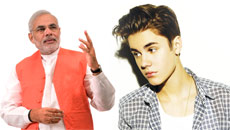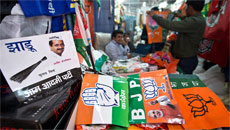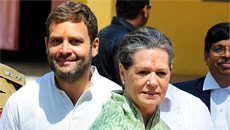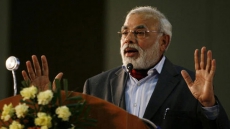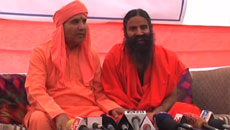If the expectations about Narendra Modi are tinged by a sense of mystery and excitement, the reason is not only that he is an outsider to the power hub of Edwin Lutyens' Delhi with its colonial era architecture - a first-time MP who becomes the prime minister - but also that his style of functioning is markedly different from the leisurely pace of the average politician.
The anticipation, therefore, is that there will be a flurry of activity on all fronts, which may include disregard for precedence and protocol and even the treading on corns. A hint of this approach which sets little store by prevailing isolated sensitivities is available from the invitations which the new government is sending to neighbouring countries to attend Modi's swearing-in ceremony.
Among them is Sri Lanka even if the gesture has riled the Tamil Nadu parties known for their angst about the ill-treatment of their ethnic brethren in the island, who have been victims of a genocidal offensive by the Sri Lankan army towards the end of the civil war.
Similarly, there are indications that Modi may move rapidly in the matter of concluding a treaty on the Teesta river waters with Bangladesh which was blocked by West Bengal Chief Minister Mamata Banerjee during the Manmohan Singh government's tenure.
What these initiatives show is that Modi will not let the grass grow under his feet when it comes to dealing with issues of national interest. In such cases, he is likely to brush aside objections from the provincial leaders which the earlier government was hesitant to do.
True, Modi has the advantage of enjoying a majority of his own with the Bharatiya Janata Party (BJP) winning 282 seats - well past the half-way mark in a house of 543 elected MPs. This is a luxury which his predecessor did not enjoy.
Even then, it is also a question of temperament. Modi is obviously far more assertive than the habitually diffident Manmohan Singh, who was also hamstrung by the fact that he had to keep Congress president Sonia Gandhi's predilections in mind when taking any decision.
Modi, on the other hand, is the master of all he surveys. This position of virtually untrammelled authority enables him to relegate to the background some of his earlier acidic observations on the neighbouring countries.
For instance, he is unlikely to be put off by a reminder - if anyone dares to jog his memory - that he once said that talks with Pakistan cannot take place amidst the sound of gunfire and berated the previous government for offering chicken biryani to a Pakistani dignitary when Indian soldiers were being killed on the border. Or of his threat to send illegal Bangladesh immigrants packing May 16, the day the election results were announced.

Of course, the attendees will be present in Delhi for a formal event and no serious discussions are likely to take place. Even then, what Modi's gesture has shown is a willingness to make a new beginning irrespective of what may have transpired in the past.
It is this propensity to move ahead which will be tested in the coming days. There is little doubt that there is a great need for Modi to do so since he is known to be carrying a lot of baggage, including the label of being a "hardliner's hardliner", to quote Salman Rushdie, relating to the Muslims.
As of now, the minorities seem to have reposed their faith in Modi in western and northern India, but not where they had a viable alternative, notably in Tamil Nadu, West Bengal and Odisha.
In these states, there hasn't been a Modi wave, with the AIADMK of Chief Minister Jayalalithaa winning 37 of the 39 seats in Tamil Nadu, the Trinamool Congress of Chief Minister Mamata Banerjee capturing 34 of the 42 seats in West Bengal, and the Biju Janata Dal of Chief Minister Naveen Patnaik bagging 20 of the 21 seats.
Since these results are a reaffirmation of India's federal character and of the presence of powerful chief ministers, Modi will know that he is still far from being a widely accepted leader like Indira Gandhi in 1971-72 or Rajiv Gandhi at the start of his career.
Arguably, if Modi had been more amenable towards the minorities, the BJP's position might have improved marginally at least in West Bengal - where it won two seats, the same as the CPI-M - because Mamata Banerjee is known to be no longer as popular as earlier.
Along with Modi's business-like approach to matters of state, therefore, what will be also under scrutiny is his ability to fulfil his pledge that his government will ensure the betterment of all, irrespective of caste or creed. The promise has evidently swayed large numbers. But parts of the country still remain unimpressed, suggesting that misgivings persist about whether he will be true to his word.
Besides, it is also undeniable that his success is the result of the outgoing government's failures. Where Modi did face some resistance, his juggernaut came to a halt.
